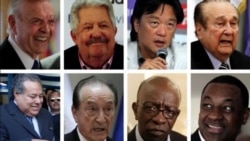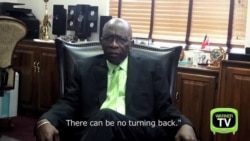The wave of evidence implicating high-level FIFA executives in a sweeping corruption scandal has mounted quickly following the surprise announcement earlier this week that football's world governing body president, Sepp Blatter, would resign.
Plea bargains and public statements by former FIFA officials threatening to spill an ‘avalanche’ of secrets indicate the case — an alleged criminal enterprise involving more than $150 million in bribes — could bring down Blatter himself.
“The guilty plea rate is over 95 percent in U.S. federal prosecutions,” said American University Law Professor Amy Tenney.
"As part of their plea agreements, defendants are going to cooperate with the government, provide information, which will allow the government to go up the chain," she said.
Although Blatter has not been indicted thus far, Tenney said he remains a target.
"You can see how the government put together all of the aspects of the case and had it set up in a way to ensure that, as time goes on, it will be able to get to the top of the heap," Tenney said.
That’s because the case hinges on the testimony of insiders.
When U.S. prosecutors announced the racketeering, money laundering and other charges against nine FIFA officials and five corporate executives last week, they also revealed that four individual and two corporate defendants had pleaded guilty in secret hearings dating back to July 2013.
“Those defendants are required to cooperate with the government as they prosecute this case — it’s a hallmark of the plea agreement system [used by U.S. federal prosecutors],” Tenney said.
Indicted former FIFA vice president Jack Warner joined the fray Wednesday by vigorously defending his reputation — and pointing a finger at his former boss.
“Blatter knows why he fell. If there is one other person who knows, I do,” Warner told supporters in his native Trinidad and Tobago, where he is out on bail after spending a night in jail.
WATCH: Jack Warner statement
Extradition hurdle
Warner is one of two former FIFA officials in the Americas – the other is in Paraguay — expected to resist extradition to the United States.
All seven defendants arrested in Switzerland last week during a raid at a five-star hotel have said they will fight extradition. None are likely to enter any plea deals unless they are in U.S. custody.
But there is a lot to be litigated before then, according to former federal corruption prosecutor Jacob Frenkel, now with the suburban Washington law firm Shulman, Rogers, Gandal, Pordy & Ecker.
"If they choose to fight extradition, that process could take anywhere from six months to even as much as two to two-and-a-half years. And while the U.S. is confident and has resolved to extradite them, that does not mean it is a done deal," he said.
Frenkel agreed with Tenney that chances are quite high the extraditions will occur.
"I believe the U.S. government has charged this case carefully to minimize the risk of Swiss law or exemptions under Swiss law, or the exemptions under the laws of any other country, that would make it more difficult for an extradition to take place," he said.
VOA's Parke Brewer and Mike Richman contributed to this story.







